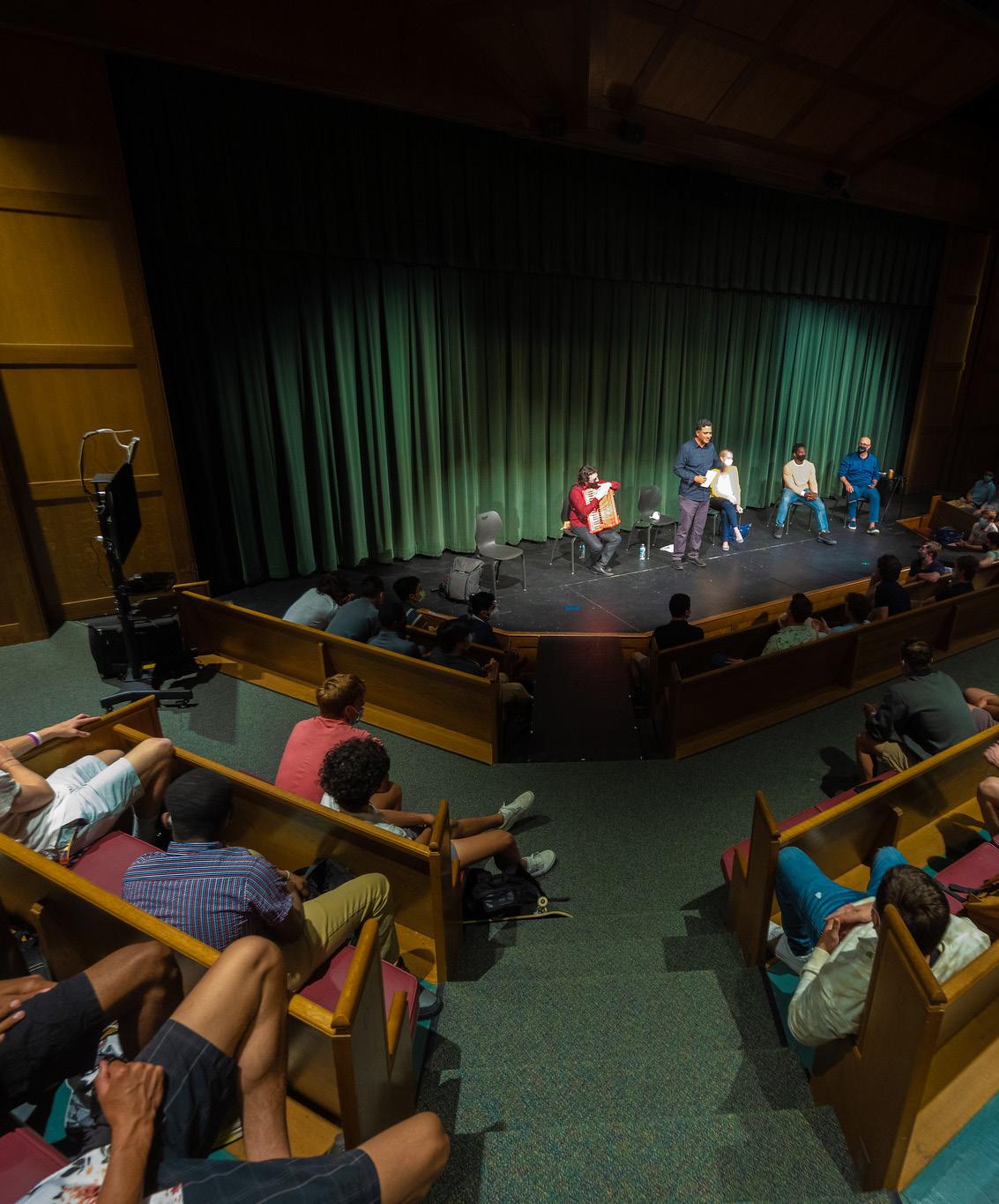
12 minute read
The Magic of Untrodden Paths, in Five Living
The Magic of Untrodden Paths, in Five Living Examples by Jake A. Carroll ’21
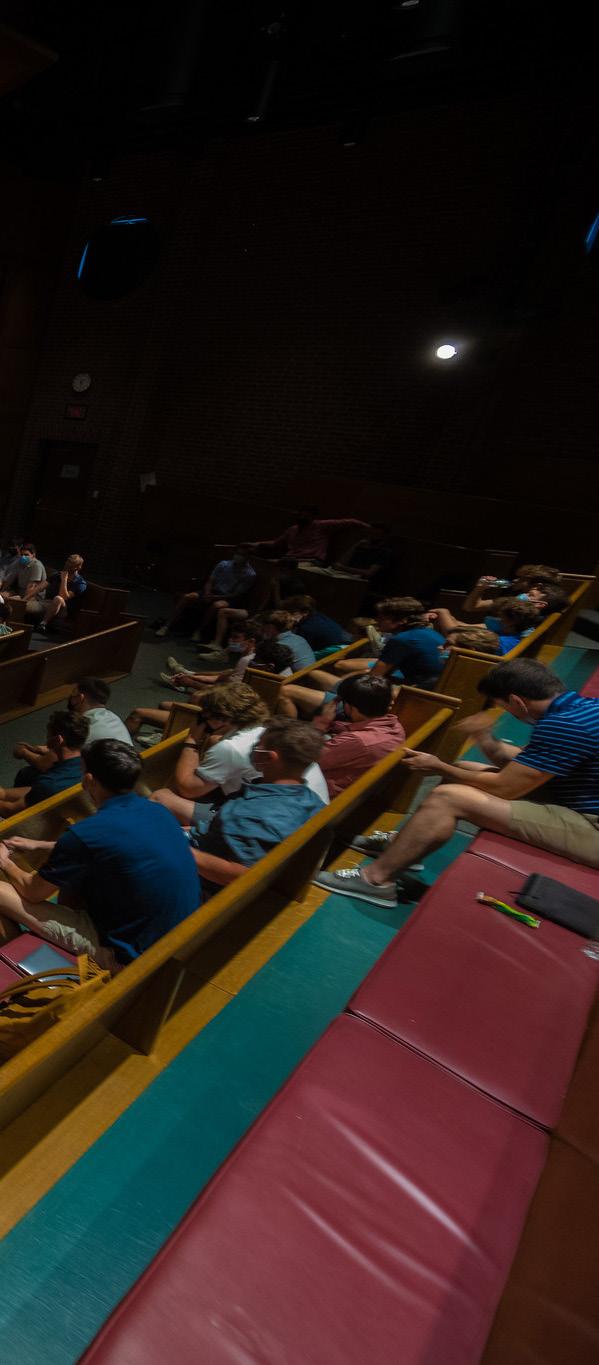
Advertisement
It is not uncommon for a school to bring in a speaker or two for the senior class, to get them thinking about the possibilities concerning their futures.* On May 25, however, before the senior class there stood five uncommon people, any of whom, alone, would have been a homerun speaker. The panel, organized by John Werner P’21, ’26, included Cory Pescaturo, Ramesh Raskar, Rebecca Love, MacCalvin Romain, and Carlos Cashman.
Cory began by talking about his journey with the accordion. He set tangible goals that he could strive for, such as best in the country, and then best in the world—which he lived up to, being a three-time world champion, in addition to holding a Guinness world record for accordion playing. As he explained, Cory is always in search of the next step, always looking for the next challenge to tackle. He attended the New England Conservatory as an accordion player, despite the NEC not teaching the accordion. He didn’t ask them to teach him to be a great accordion player, he asked them to teach him to be a great musician. This demonstration of resourcefulness can act as a wealth of inspiration for anyone who hears it. Cory’s journey is an excellent example of the power of discipline, and his methods can be applied to any out-of-the-box calling that we may have.
Ramesh shed light on the balance between the importance of privacy and the societal benefits of an honest, unbiased technological arbiter that has already begun to manifest in our lives, such as Google Maps and other transportation aids. One of the leading experts in the technology world, Ramesh spoke about the future of AI in our lifetimes and touched on the ways in which it may change our lives. His take on these sophisticated topics is bolstered by his considerable background in a plethora of start-ups, inventions, and TED Talks. Ramesh won the MIT-Lemelson prize, which has been dubbed by many the Nobel Prize for engineering. Ramesh is one of the most innovative inventors and thinkers of our time, and he was sitting less than ten feet from our senior class! (In fact, he gave the graduation speech at UNC a few years back, and so his presence in RL’s Smith Theater is a great reminder

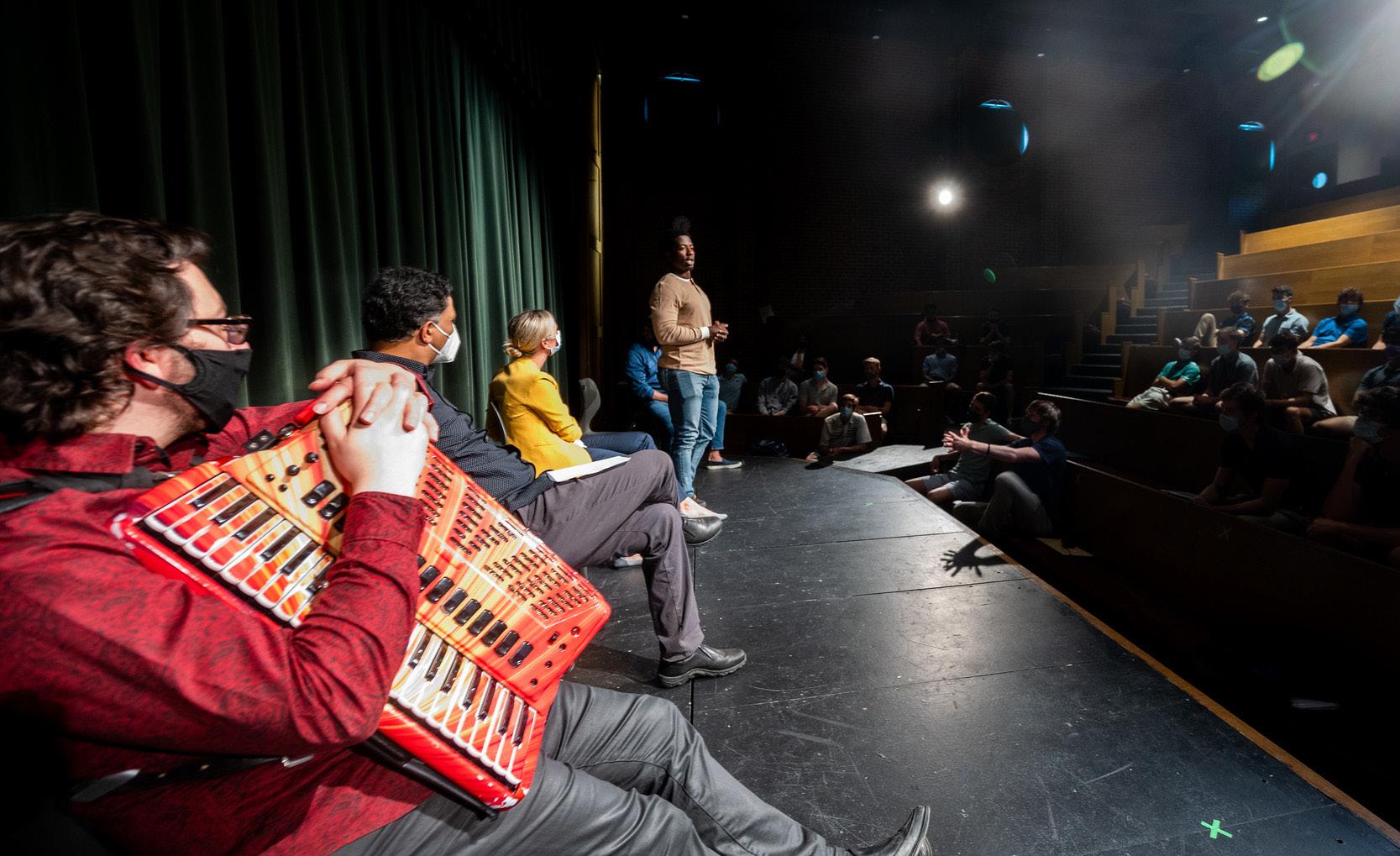
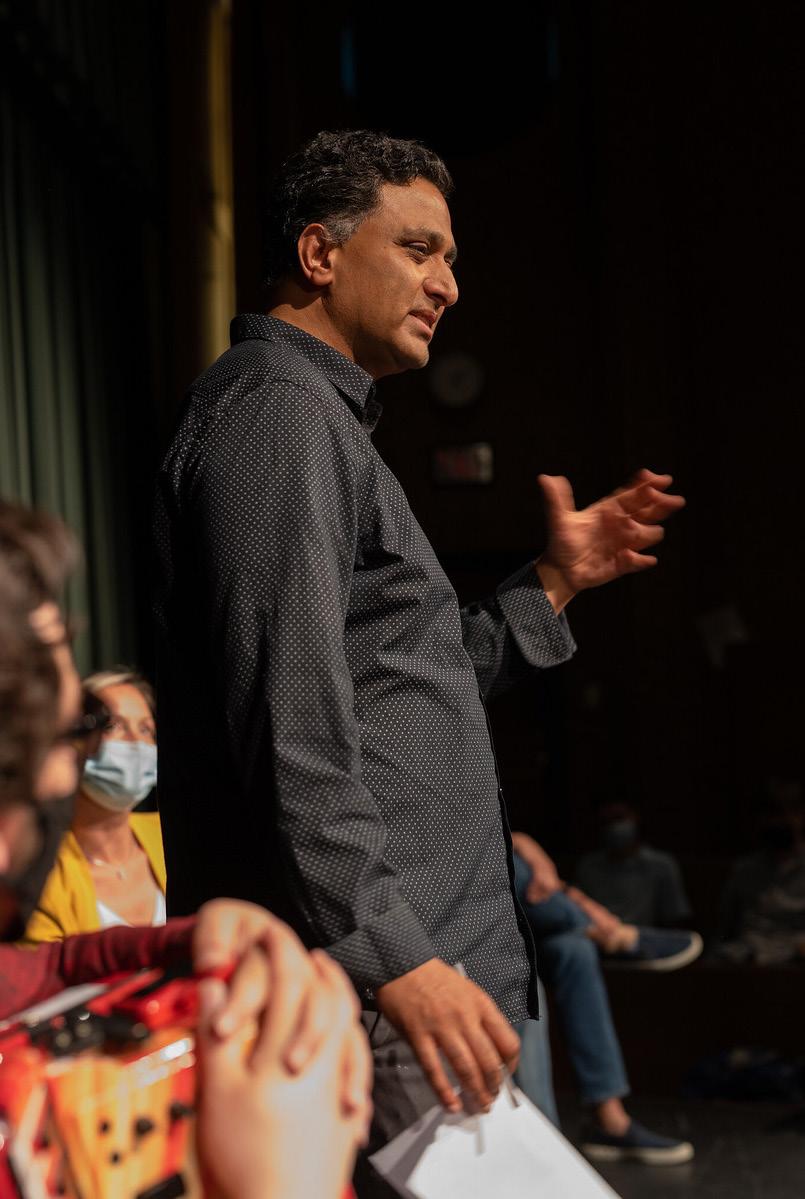


of the fortunate situation that we are in, and the incredible people we get to meet and hear from.)
Rebecca walked us through her experience of becoming a nurse, though she admitted that at the time she would have preferred to become a lawyer. She then went on to change the entire sector of nursing almost single-handedly. She brought the problematic treatment of nurses to the forefront of the medical field and has continued to break down barriers in that vein. She started a program at Northeastern for nurses and helped to distribute masks and other PPE to nurses during COVID-19. She spoke about the sexism she sees in her line of work—an apt subject to discuss with a graduating class at an all-boys’ high school. Rebecca demonstrates, especially to this senior class, that any of us could perhaps make it as a doctor or a lawyer, but that being a leader is more difficult, and that leadership is a crucial trait to develop in the world we are stepping into.
MacCalvin grew up not far from Roxbury Latin, and his life story is one of trailblazing and giving back. He went to the Boston Latin School and then Boston College, where he walked onto the basketball team (an inspiring story for those looking to start up or step up their athletic careers in college). He worked in IT after college, earning his MBA after receiving a full scholarship to the Ross School of Business at the University of Michigan. He ultimately decided to forge his own path, consulting for companies, becoming the reverse mentor for Digitas’s CEO, and now helping to strengthen social equity laws in Massachusetts. He is an example not only of personal success, but also of helping those around him, no matter where he is or how much he has done.
Finally, Carlos discussed a series of successful business ventures he was part of after graduating from MIT. Those ventures were only the beginning. His experience and unorthodox views currently have him heading Thrasio, the fastest company to both hit a one billion dollar valuation and be on track to hitting one billion dollars in revenue. Carlos and Thrasio are reinventing e-commerce, which is a rapidlygrowing four trillion dollar industry. Carlos emphasized the importance of taking advantage of the present moment and the opportunities before you that often go unnoticed. Mr. Werner, bringing together this panel of titans, connected the dots between each member and revealed to the senior class that each one of them was an entrepreneur in their own way. He emphasized the diverse ways in which entrepreneurship can manifest, laying the groundwork for future revelations and for ways each senior can create his own version of entrepreneurship. Ultimately, this panel revealed that some level of entrepreneurship is necessary for living a meaningful life, and that pushing the boundary in any industry falls under the umbrella of entrepreneurship. The subtle but powerful “Aha!” moment for me was that—in their entrepreneurship—each of these speakers followed their own path, a path that embodies their own passions and personalities. My takeaway: I believe this is where their success lies.
At the end of the panel, Mr. Werner suggested that these interesting and inspiring individuals could serve as “verbs” for our class. This seemed a fitting description; as we continue our lives, faced with our own unique challenges, we can reflect on the powerful ways that these speakers have broken down barriers in their lives, and then apply those to our own as we continue to craft our character and resolve. I believe the wisdom of these five speakers will be reverberating in our heads as we live our lives and hear inner voices calling us to untrodden paths. //
*Editor’s note: Due to the pandemic’s disruption to school life and events during the spring of 2020, the Class of 2021 was not able to benefit from the RL@Work program they would have experienced in their junior year. This May’s programming and panel of speakers was, in part, an effort to connect the students with a variety of professionals outside of our campus walls. The panel discussion was the culmination of a day-long program during which Class I focused on “what comes next” for them, after Roxbury Latin. The day, organized by Assistant Headmaster for Advancement Tom Guden ’96 and faculty member Elizabeth Carroll, also included an introduction to resume building, networking, and interviewing skills. We would also like to thank RL parents Bryan Anderson, Tyhesha Harrington, Paul Lonergan, and Tom Peterson for their help in making the day a success.
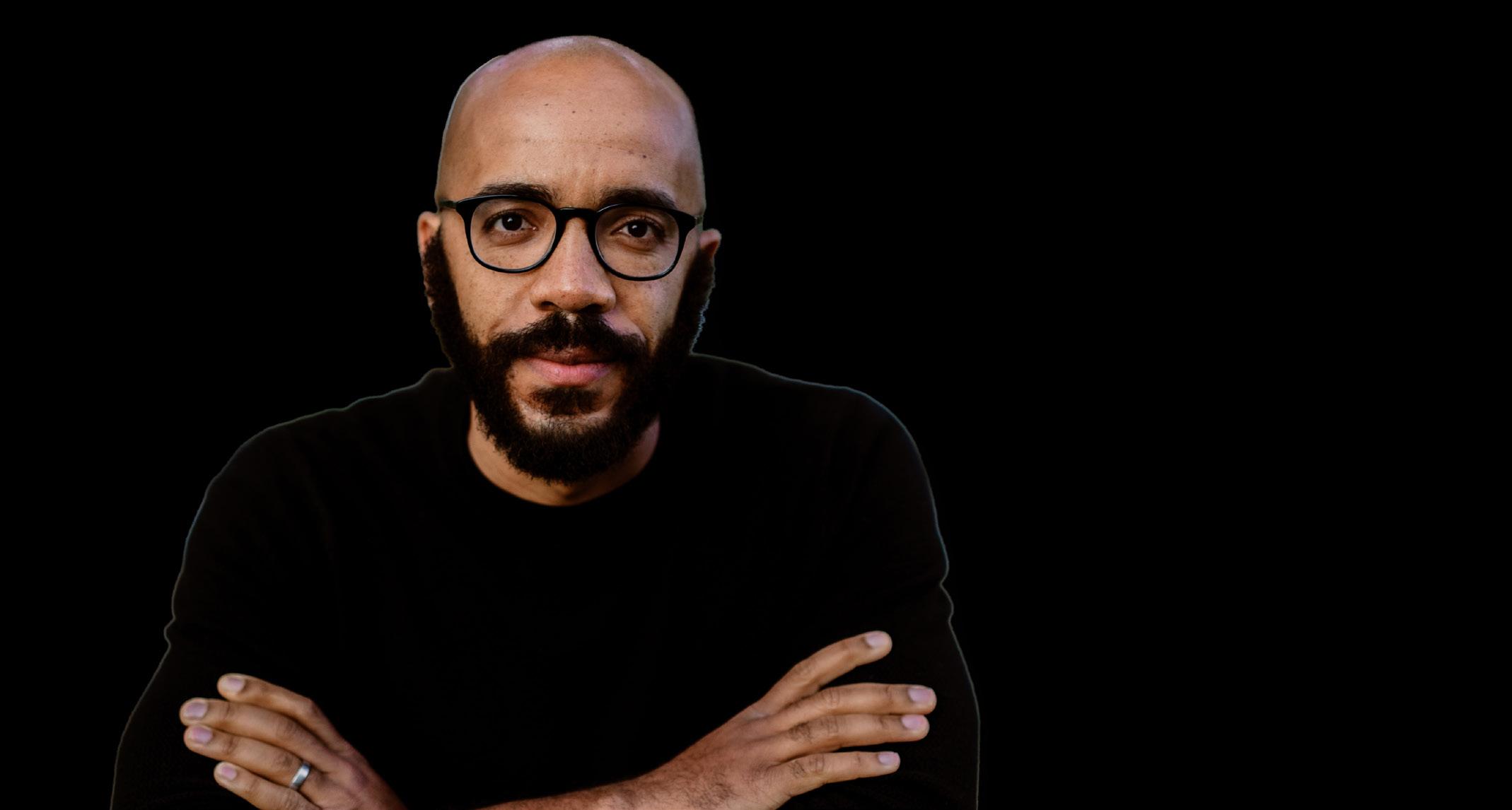
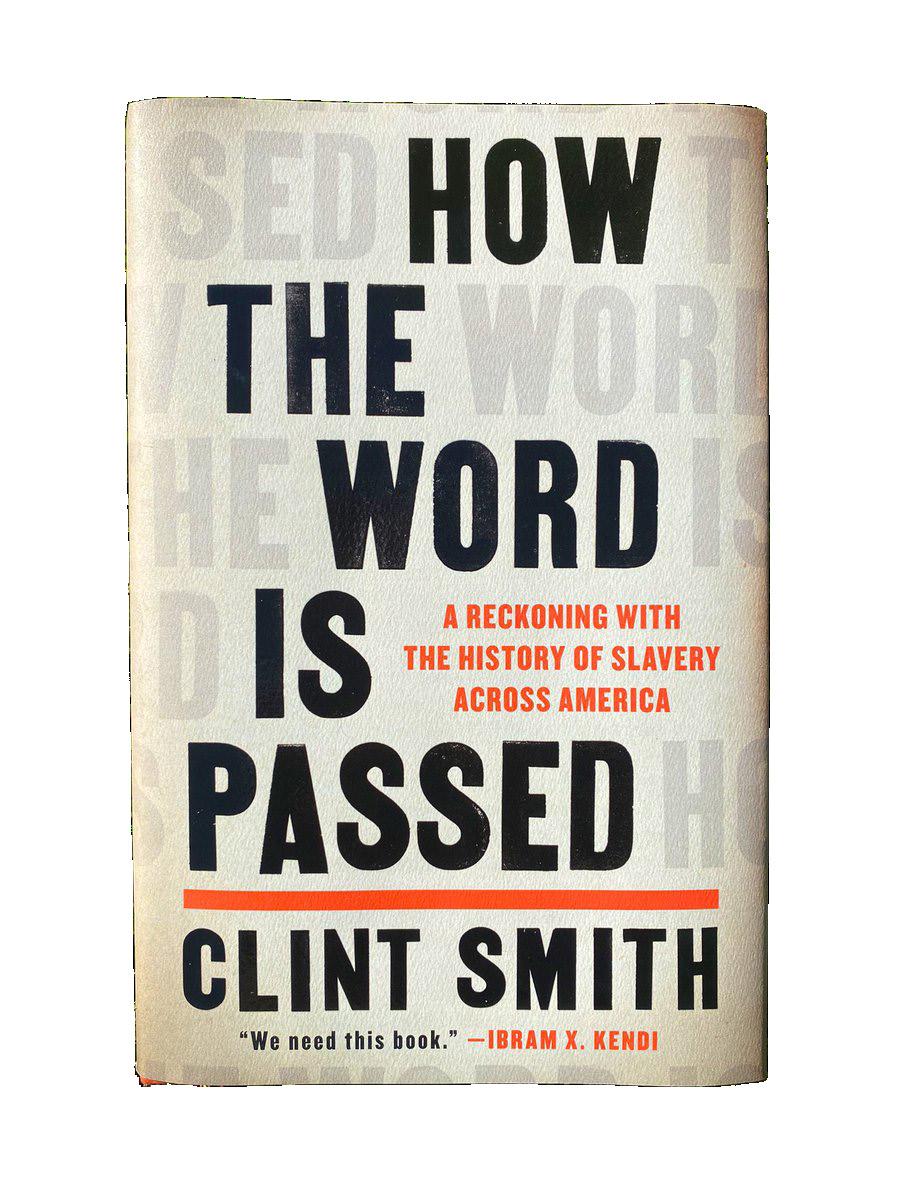
Photo by Carletta Girma
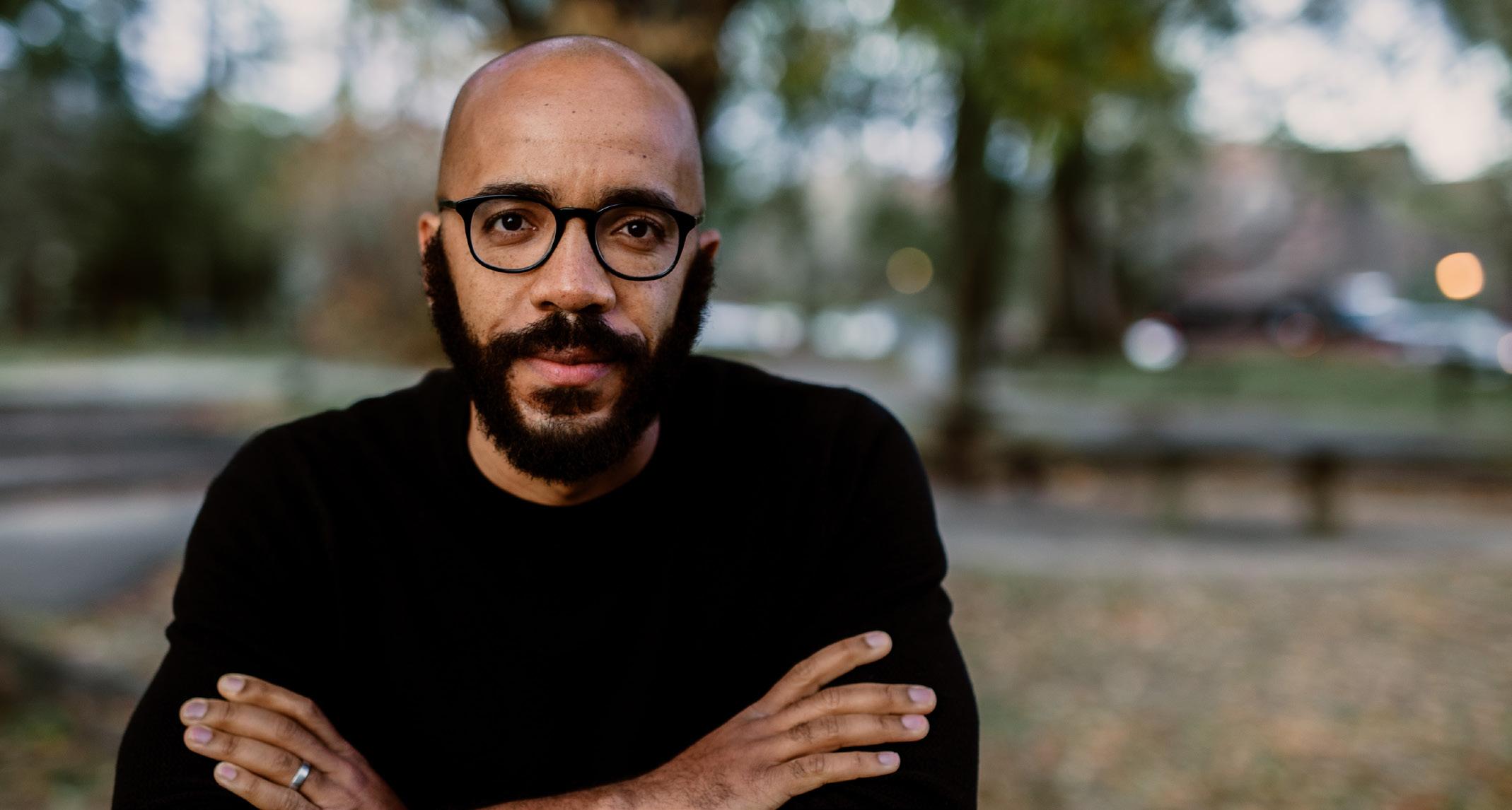
Writer and Poet Clint Smith Weaves Artistry With Activism
On April 8, Clint Smith—writer, poet, scholar, and activist—spoke with students and faculty in virtual Hall about his poetry, his passionate support of the racial justice movement, and his newest project—his non-fiction book debut, How the Word is Passed: A Reckoning With the History of Slavery Across America, which will be published this summer.
“I’ve spent the last four years reading and being transformed by history books,” Mr. Smith began, “and I wondered, ‘How can a poet contribute to this historiography?’” Prompted by watching monuments to the Confederate Army come down in 2017 in his home city of New Orleans, Mr. Smith launched into this project, through which he explores how different cities and sites across the country reckon with, or fail to reckon with, their relationship to the history of slavery. For this project, Mr. Smith traveled to—and chronicled what he learned and experienced in—places like Monticello Plantation and Angola Prison, Galveston Island and New York City.
During Hall, Mr. Smith spoke about how important it is that we learn about, discuss, and understand the totality of our country’s history, and the people within it. He talked about how Thomas Jefferson, for instance, was “a brilliant mind, who helped to create the greatest experiment in democracy that the world has ever seen,” but that he also held more than 600 slaves over the course of his life, including four of his own children whom he had by his slave Sally Hemings. “How do we hold and understand two truths at the same time?,” he asked. “It’s important that we face these difficult realities and deal with these tensions. And we might not all agree in the end, but these are conversations we need to be having.”
Mr. Smith also read aloud some of his poetry, including a new poem that was “a letter to four presidents who held slaves,” and the title poem of his 2017 collection, Counting Descent. In an extended Q&A session, he answered questions about his writing style and process; the topics he addresses in his poems and essays; and about how we grapple with American history, reconciling the admirable with the loathsome.
Mr. Smith is a staff writer at The Atlantic. His essays, poems, and scholarly writing have been published in The
New Yorker, New York Times Magazine, The New Republic, The Paris Review, and other esteemed publications. His first full-length collection of poetry, Counting Descent, won the 2017 Literary Award for Best Poetry Book from the Black Caucus of the American Library Association and was a finalist for an NAACP Image Award.
Mr. Smith is a 2014 National Poetry Slam champion and a 2017 recipient of the Shestack Prize from the American Poetry Review. He has been named to the Forbes “30 Under 30” list as well as Ebony Magazine’s Power 100 list. His two TED Talks, The Danger of Silence and How to Raise a Black Son in America, collectively have been viewed more than 7 million times. Mr. Smith has received a number of prestigious national fellowships; he has taught high school English in Maryland where, in 2013, he was named Teacher of the Year by the Maryland Humanities Council. He currently teaches writing and literature in the D.C. Central Detention Facility. Mr. Smith earned his B.A. in English from Davidson College and his Ph.D. in Education from Harvard University. //
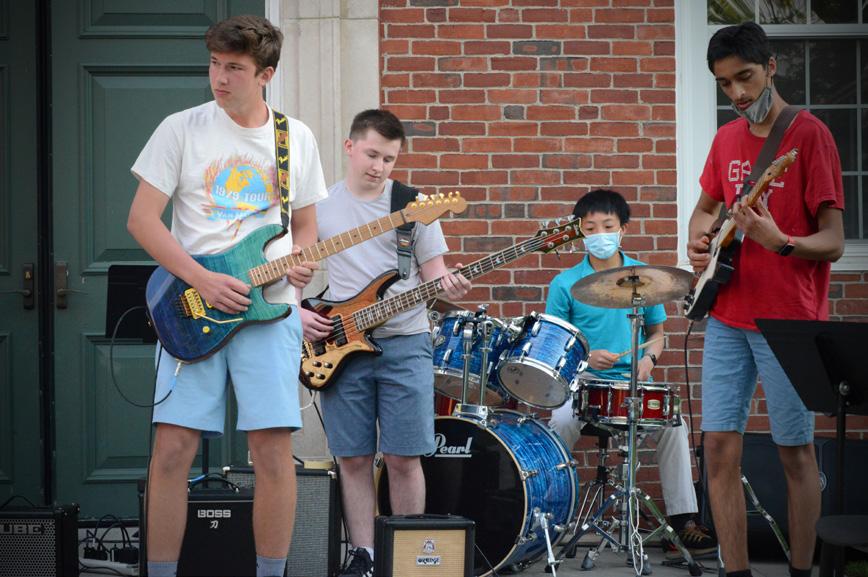
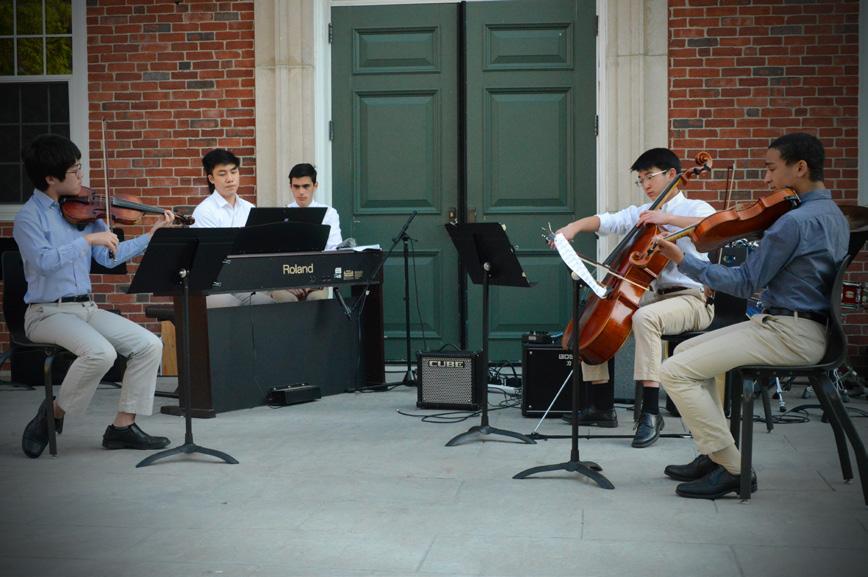
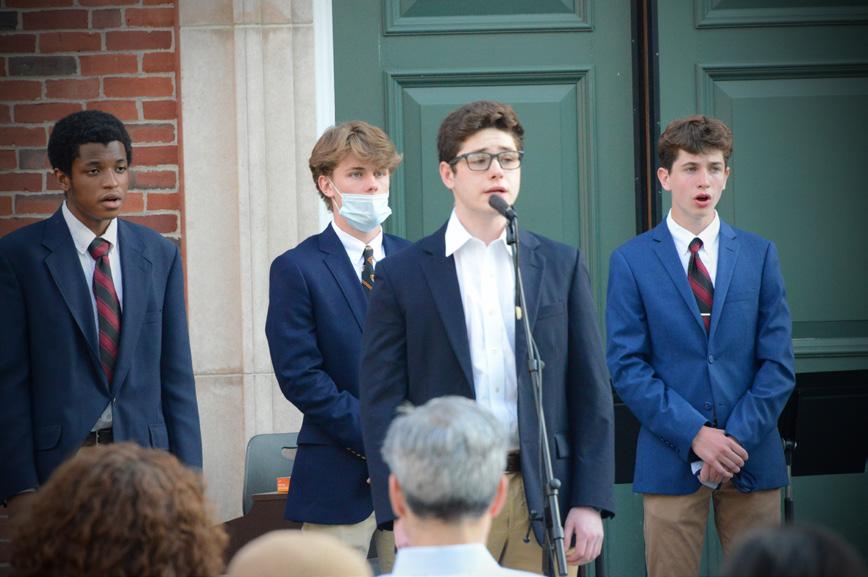
Live Music on Campus Again, At Last!
May 20 marked a momentous occasion for this singing school: Roxbury Latin hosted its first live musical performance in 14 months. On a beautiful, sunny evening, outside in the Smith Arts Center Courtyard, guests sat—spread out, in chairs on the lawn—and enjoyed performances by students in Class VI through Class I, instrumentalists and singers, performing a range of music that they’ve been practicing, in person and via Zoom, throughout this pandemic year. //
Art was Alive on Campus this Spring

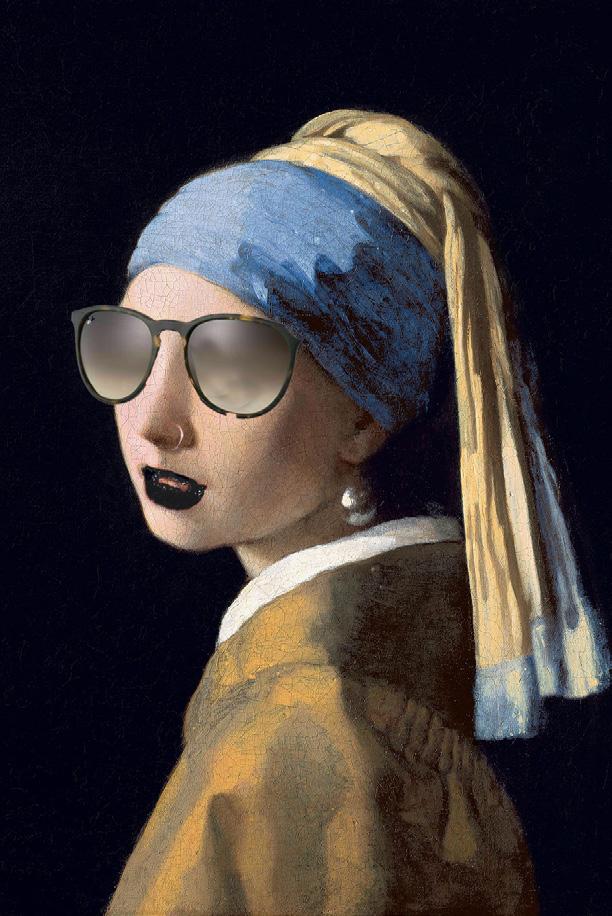
Sixies in Ms. Sonja Holmberg’s Digital Design class created “Mixed-Up Masterpieces,” putting their own modern spins on everything from Van Gogh’s self-portrait to American
Gothic. //
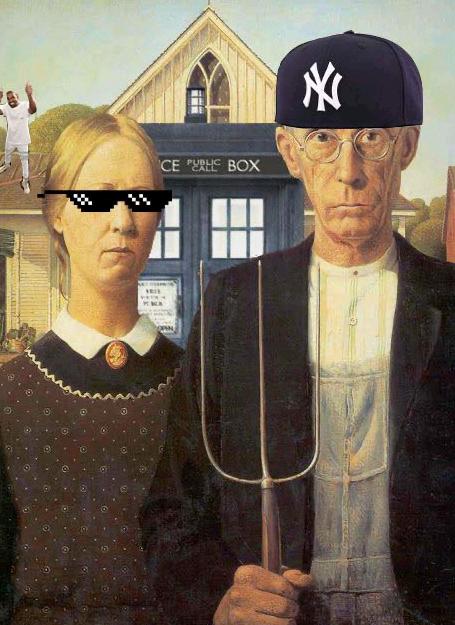



When Dr. Sue McCrory charged students this spring with creating a “site-specific design” for installation at school, Nick
Frumkin (III) executed this conceptual wall drawing—inspired by
Sol LeWitt—on the back of the stage doors in the scene shop, with a little help from his friends. //
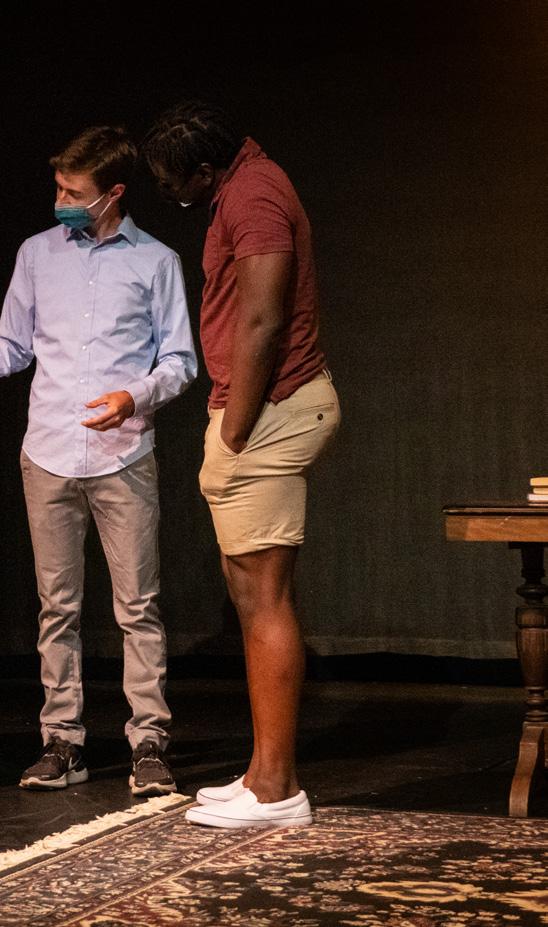
On May 24, Alejandro Denis (II) and David Sullivan (II) acted in RL’s first and last live performance of the year in the Smith Theater, delivering two scenes from Yasmina Reza’s Art, which explores dynamics of artwork and friendship. //
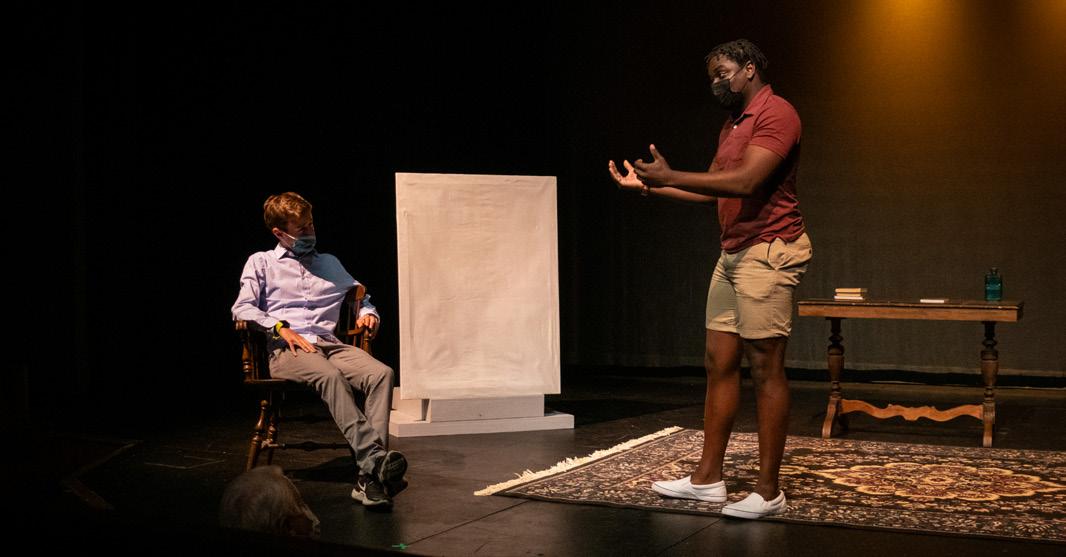
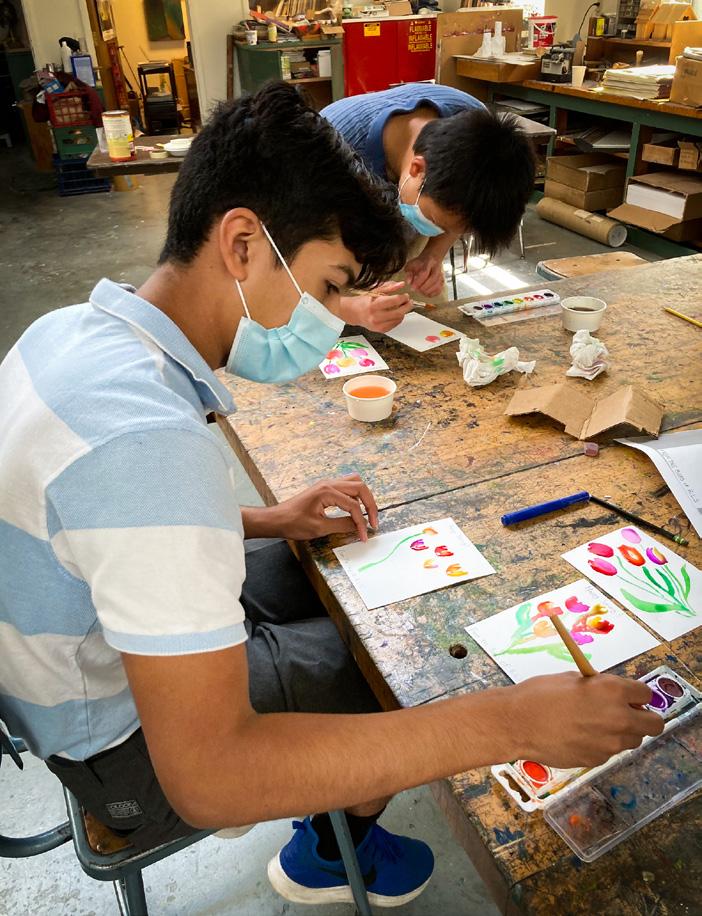
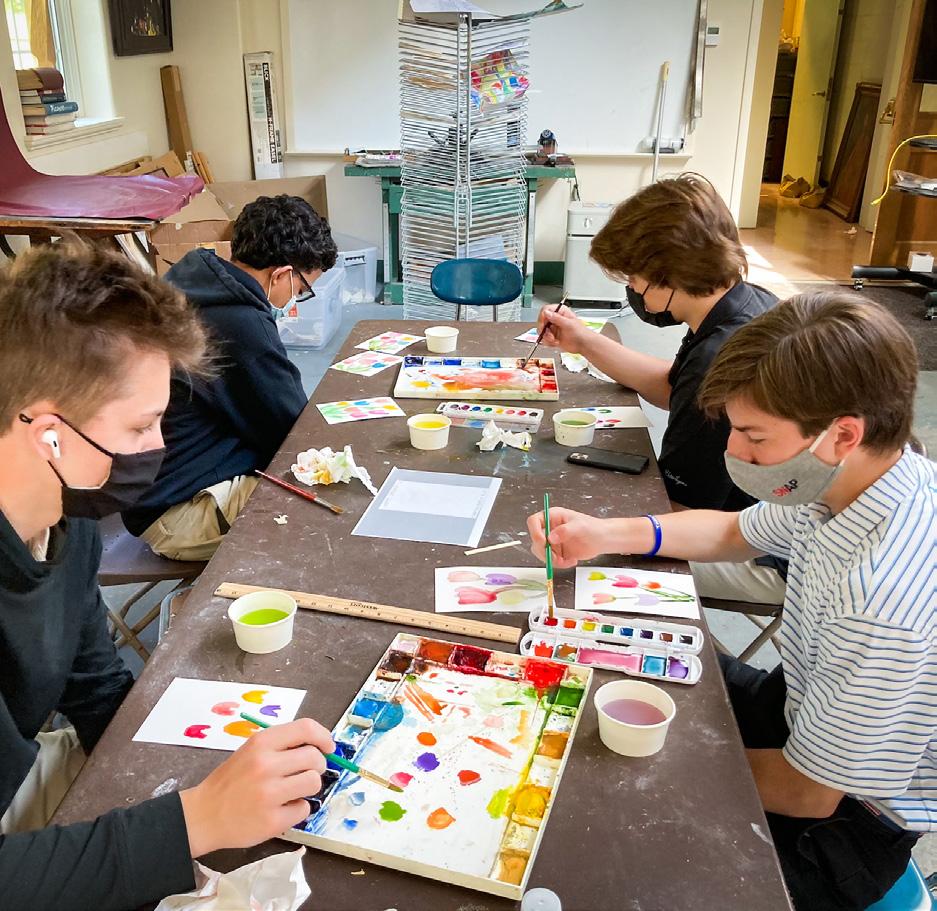
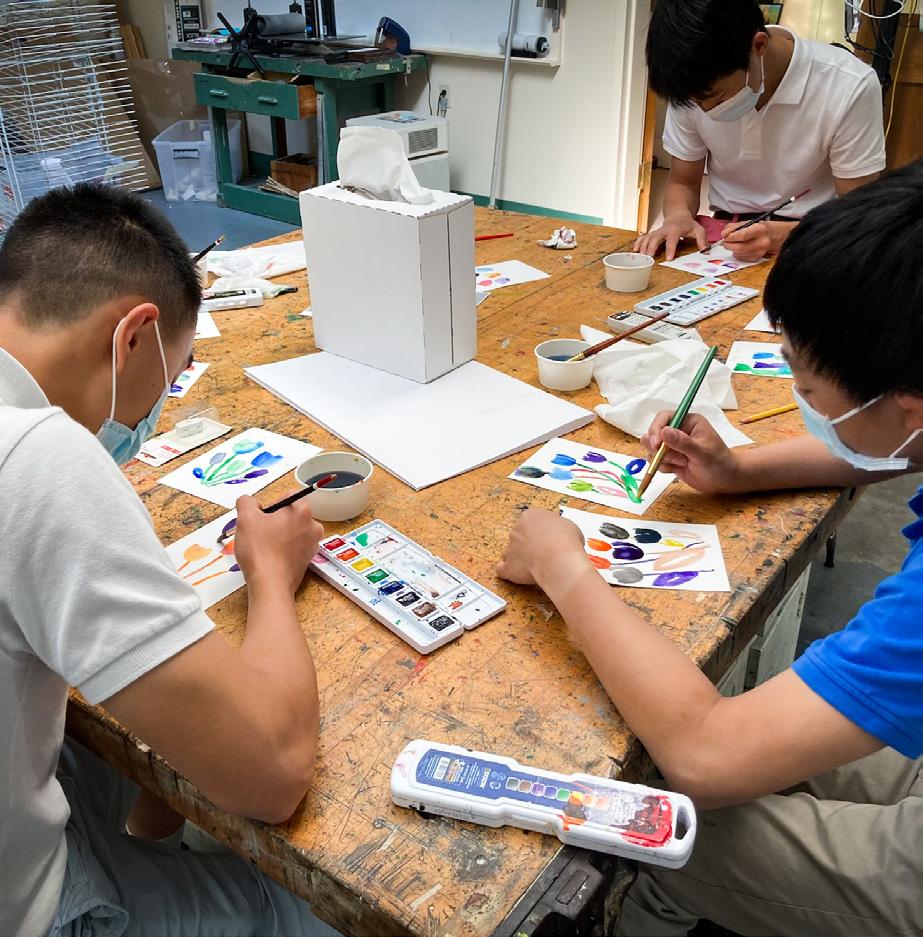

On May 24, Dr. Andrés Wilson hosted a virtual Creative Arts event featuring the poetry, essays, and short stories of nine students, Class
VI through Class I.
Enjoy the featured poetry contribution by senior Conor Downey, inspired by his hobby of creating with stained glass. //
At the end of the school year, students in Class IV created watercolor paintings of tulips to frame and deliver as gifts to the elderly residents of RL’s neighboring
Deutsches Altenheim—a long-time service partner of Roxbury Latin and Class IV. (Special thanks to Mr. Jim Ryan for creatively keeping boys engaged with the residents throughout the year, despite the many COVID restrictions!) //
Stained Consecration
by CONOR DOWNEY
Crystal grozings spear palms, cautious work of Pilate. small sacrifice for painting with light, the blood of Christ. I spill in my passion.
Lead-lined transubstantiation, lather the wine-red pigments an absolvent trinity of material, upon the wise throne of my own God pressed in molten hues.










